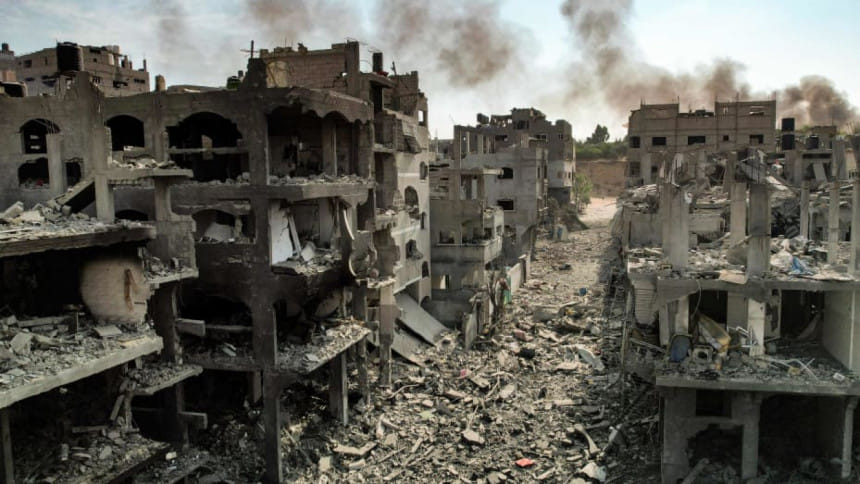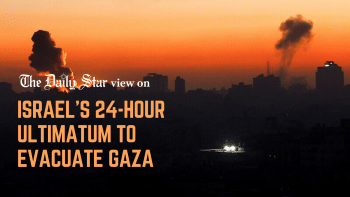The Implications of the Israel-Hamas War for Bangladesh: An American perspective

The Israel-Hamas war, now in its third week, broke out at a moment when global geopolitics were already in a state of deep churn.
The world had experienced, over a period of just two years, multiple black swans – a term famously coined by Nassim Nicholas Taleb that refers to events that are wholly unforeseen and have massive ripple effects. First came the COVID pandemic, and then Russia's invasion of Ukraine. These two shocks slammed the globe amid intensifying great power competition, toxic nationalism, growing refugee crises, and worsening climate change effects – among other destabilising developments.
And now comes this new war. Because of the legacy of conflict in the Middle East in recent decades, it's not a total shock. But it is still difficult to grapple with Israel's massive intelligence failure, the horrific scale of Hamas's terrorism on October 7, the uncompromisingly brutal Israeli retaliation, and above all the immense human toll.
With Washington focused intently on the war, and also facing allegations of moral hypocrisy for failing to object to Israel's brutalities – some experts call them war crimes – against Palestinians, Dhaka might have hoped it would get a respite from the Biden administration's relentless pressure campaign on rights and democracy in Bangladesh. But it wasn't meant to be.
Few countries will be unaffected, even if indirectly, by the war. There will be economic implications, especially global oil price spikes and impacts on energy trade. There will be security implications, from new terrorism threats to public unrest sparked by large and angry protests.
The jury is still out on the conflict's geopolitical impacts, but so far this much is true: Washington – and many of its allies and partners – won't be advantaged by a long war. The conflict has upended a new US vision of the Middle East, which revolves around a region that becomes a locus for trade, connectivity and infrastructure development with deeper links to Europe and South Asia. Washington wants to operationalise that vision by stitching together new integrative mechanisms – from the India-Israel-UAE-US quad to the India-Middle East-Europe Economic Corridor. But these initiatives require stability and cooperation to succeed. The war delivers a tragic reminder that both remain elusive, even with less conflict in the region and new peace deals between Israel and some of its neighbors over the last few years.
Additionally, the war has diverted Washington's attention away from the Indo-Pacific and prompted the Biden administration to strengthen its force posture in the Mideast. This change, while likely temporary, may rekindle longstanding doubts in many Indo-Pacific capitals about Washington's true commitment to a rebalance to the region – and risk undermining very real recent progress toward that goal, including the implementation of a US Indo-Pacific strategy.
Furthermore, America's competitors benefit. With Washington and many of its European and Asian allies focused laser-like on the conflict, Moscow and Beijing will have opportunities to test a distracted Washington in Ukraine, or in the South China Sea and Taiwan Strait, respectively. South Korea has gone so far as to publicly threaten to suspend a military agreement with North Korea so that it can scale up surveillance of its neighbor, because Seoul fears Pyongyang may be tempted to do to South Korea what Hamas did to Israel. Meanwhile, Iran benefits because the war ends any immediate chances of new normalisation agreements between Israel and its Arab neighbors linked to the Abraham Accords, which Tehran has long rejected and Washington seeks to expand.
Not to mention, US competitors can exploit the rage that has erupted against the United States among publics in the Middle East and beyond about Washington's firm backing of Israel during the war despite the latter's brutal tactics against Palestinian civilians. They can point to this as another – and especially egregious – case of the US failing to uphold its oft-stated intention to champion moral causes abroad.
All this said, the war has generated far more solidarity among Western capitals than has been the case with their reactions to the provocations of Russia or China. (Many of them still depend on energy imports from Moscow and broader trade with Beijing).
That India has embraced the West's position also helps Washington and its Western partners. New Delhi will further strengthen a relationship with Israel that has been expanding for years – and especially during Narendra Modi's time in power.
Elsewhere in the Global South (and, to be sure, among large portions of the public in the West), reactions to the war have focused more on the plight of the Palestinians, the need for a cease-fire, and the imperative of a Palestinian state. These reactions are driven by various factors, depending on the country. They include a lack of formal ties with Israel; deep historical links to the Palestinians, especially through the Non-Aligned Movement; a preference to side with the perceived strongest moral position; hostility to the policies of the US, one of Israel's staunchest allies; and, in the Global South's many nonaligned capitals, a desire to avoid taking a position espoused by many within the Western alliance system.
Consequently, the war could deepen policy divides not only between the West and the Muslim world, but also between the West and the Global South. That latter schism is already considerable, due to triggers ranging from climate change mitigation financing to patent rights for pharmaceuticals.
Where does this all leave Bangladesh? Dhaka has emphasised the need for an "urgent cease-fire" and co-sponsored an ultimately unsuccessful UN Security Council resolution calling for an end to hostilities. Like so many countries, Bangladesh gains little from a long war, and especially because of the deleterious economic implications – and these will become even more serious if it expands into a regional conflict. Bangladesh relies heavily on oil from the Gulf, and the Middle East is a key destination for its textile exports. Bangladesh central bank data from earlier this year showed that two thirds of Bangladesh out-migration was to the Middle East, and that the Gulf region accounted by far for the largest source of remittances to Bangladesh.
Another ominous development for Dhaka is that the war is intensifying great power rivalry. Russia and China have thrown their support behind the Palestinians (even though both still have cordial relations with Israel). This will also bring them closer to Iran – another US rival, and a country already moving closer to both Moscow and Beijing well before the war began. Washington and New Delhi are seemingly lining up on one side of the conflict, and Beijing and Moscow on the other. This new fault line means geopolitical competition will grow even fiercer, exacerbating Bangladesh's challenge of balancing its relations with all four countries.
With Washington focused intently on the war, and also facing allegations of moral hypocrisy for failing to object to Israel's brutalities – some experts call them war crimes – against Palestinians, Dhaka might have hoped it would get a respite from the Biden administration's relentless pressure campaign on rights and democracy in Bangladesh. But it wasn't meant to be. Last week, a senior US official, Afreen Akhter, visited Dhaka and reiterated longstanding U.S. messaging about the importance of free and fair elections.
Clearly, even amid the war and so much global churn, some things have remained the same. That includes Washington's ongoing efforts to make Bangladesh a core focus of its values-based foreign policy.
Michael Kugelman is director of the South Asia Institute at the Wilson Center in Washington, DC.
We welcome your contributions and analysis of global events. To submit articles to our new page, Geopolitical Insights, please send us an email at [email protected] or [email protected]
Follow The Daily Star Opinion on Facebook for the latest opinions, commentaries and analyses by experts and professionals. To contribute your article or letter to The Daily Star Opinion, see our guidelines for submission.

 For all latest news, follow The Daily Star's Google News channel.
For all latest news, follow The Daily Star's Google News channel. 










Comments